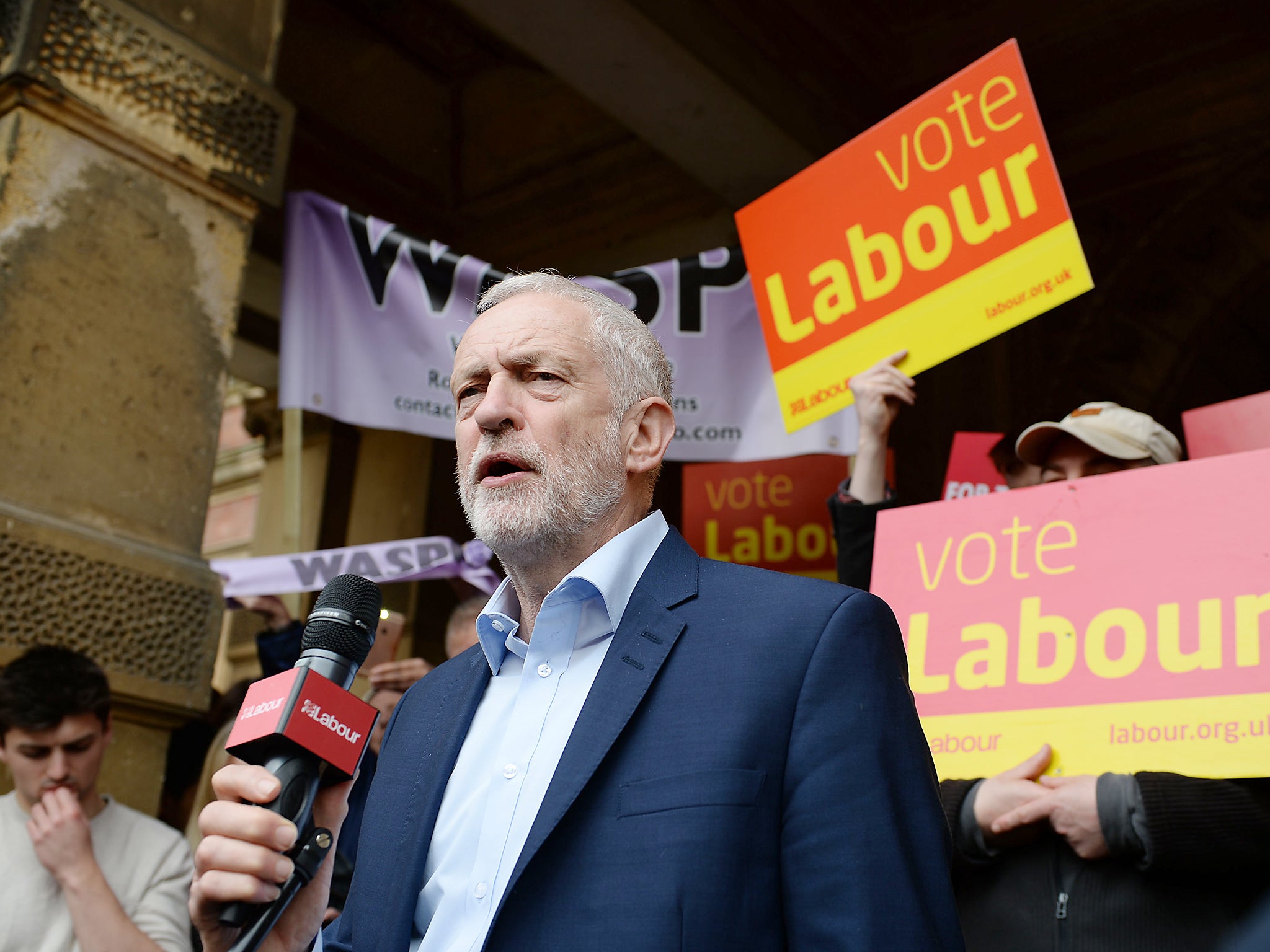Jeremy Corbyn says he has four weeks to win voters over. Labour had four years and it failed at that task
Historically, though sometimes forgotten, Labour has run efficient and coherent election campaigns. This isn’t one of them, but neither is it the disaster many expected – yet

Welcome, then, Mr Angry. Jeremy Corbyn seemed less like a polytechnic lecturer on Tuesday and more like a tribune with fire in his belly. The actor Julie Hesmondhalgh, also pretty passionate, set up his crowd and he came out fighting.
It played well. No one seems to mind Mr Corbyn purloining an old Blairite slogan about the “many not the few” (after all, even Theresa May has tried to do that). He didn’t read out the stage instructions (“pause for applause”), and he didn’t ask Seumas Milne if this was still “a good idea”.
Because expectations of the Labour Party’s efforts in fighting this election have been set so woefully low, the fact that Labour and its leader managed a lively and competent start to launch their formal campaign has given the party a little momentum, and some hope. By the same token, the Prime Minister’s astonishingly nervous, insipid and absurdly stage-managed performance, including an almost North Korean level of press manipulation, has earned her some unfavourable reviews. Ms May’s majority, whatever it turns out to be, will be won despite, not because of, her campaigning abilities.
Yet there is no need to get overexcited about one good day for the Labour Party and another indifferent one for the Tories. Ms May remains ahead in the polls, with a healthy lead over Labour, sufficient to deliver her a working majority. Most people do not spend much time thinking about politics – even in these febrile times – and make their minds up about how they may vote long before a general election.
This year the kaleidoscope has been shaken up rather more than usual, because of Brexit and the collapse of the Ukip vote, as well as some early signs that the high tide of nationalism in Scotland and Wales has passed. Nonetheless, it has seemed overwhelmingly likely that the Conservatives would win the next general election since at least Ms May came to power, and that has more or less been the consistent pattern ever since. But that doesn’t necessarily mean she will win big.
Election campaigns rarely, if ever, shift opinion so radically that they change a long-predicted outcome. Historically, there have been upsets, but often as not because the polls simply read public opinion wrong, rather than some dramatic late swing in the public mood.
Mr Corbyn, speaking in confident style, told his party and the country that, “We have four weeks. Four weeks to take our message to voters to convince them Britain can be better. It can be transformed. It doesn’t have to be like this.” Maybe not, but the harsh truth is that Labour has had rather longer than four years to get its act together and mount a serious challenge to the Government, and especially to Brexit, and it has failed in that historic task. It is simply too late to alter established perceptions of Labour and its leader.
Labour has lost seats in every general election since 2005, remains wiped out in Scotland, and will do barely better than in its historic defeat in 1983. Labour cannot win a majority in the Commons, or even have much chance of being the largest party, without restoring its strength in Scotland, and that is further away than ever. It was once thought that Mr Corbyn’s more leftish politics would do that trick; for whatever reason, it has not. Perhaps it is too late.
That the Conservatives have no ideas, few new policies and no charisma. That they will likely be lucky enough to nevertheless win 40 per cent of the vote doesn’t alter that.
And yet politics can be an unpredictable business, and the Conservatives are certainly not having things their own way in thrashing Labour. It is possible – it cannot be put any more strongly than that – that Labour and the Liberal Democrats, with the advantage of the time this overlong campaign has given them, will manage to craft policies and encourage tactical voting to their mutual advantage.
Labour’s individual policies and some of its rather primitive rhetoric about Philip Green and Southern Rail bosses do seem to have hit a public chord, while the Conservatives are being embarrassed by having to rely on a recycled Ed Miliband idea to cap energy prices. It makes them look rather desperate. By contrast Labour’s policies on tax show that they have learnt the lessons of the past and are avoiding promising more pain for average earners. Diana Abbott’s brain fade apart, Labour has yet to have any truly meltdown moments in this election.
There is still time for Labour to narrow the lead, or fall apart. The difference between those two will probably depend on the economic policy as presented in the manifesto. If it is fair, watertight and adds up, then they may yet push ahead. If, as so often in the past, the economic policy looks literally incredible, then Ms May could yet rout them.
Mr Corbyn and Sir Keir Starmer could also spend more time persuading the country why the tough Ms May wouldn’t be the best person to get a Brexit deal from President Macron and the EU Commission, an argument that the Tories appear to be winning by default.
So far Labour has, in the circumstances, remained surprisingly peaceful and united. Thus far, the right and centre of the party have held their nerve and not played into either the Tories’ or the Labour left’s hands by laying into Mr Corbyn. As Tony Blair has signalled, they realise that launching a civil war now would simply supply Mr Corbyn with a handy alibi for defeat, and help Ms May win an unrepresentative pro-hard Brexit “mandate”.
Historically, though sometimes forgotten, Labour has run efficient and coherent election campaigns. This isn’t one of them, but neither is it yet the disaster many expected. Without the right leader and the right policies and the right image, however, a good campaign has never been enough to put Labour in power.


Join our commenting forum
Join thought-provoking conversations, follow other Independent readers and see their replies